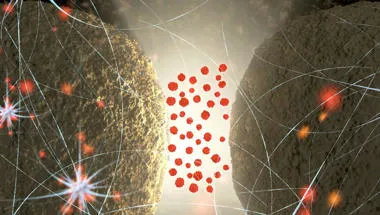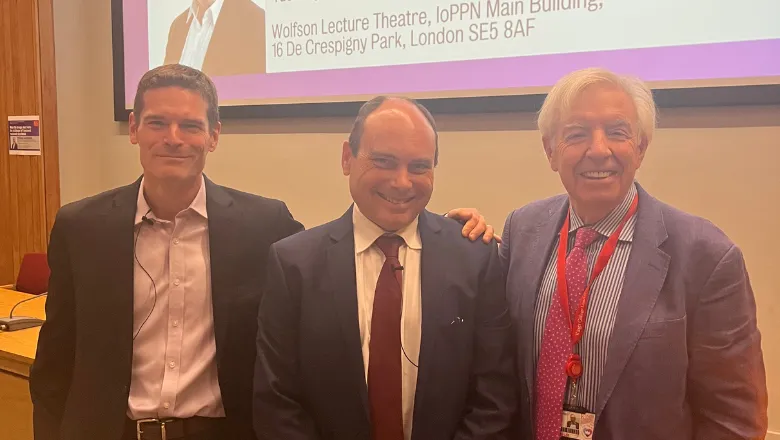
Professor Oliver Howes
Professor of Molecular Psychiatry
- Head of Department, Psychosis Studies
Research interests
- Mental Health
- Psychiatry
Contact details
Biography
Oliver Howes is Head of Department, Psychosis Studies and Professor of Molecular Psychiatry at the Institute of Psychiatry, Psychology & Neuroscience (IoPPN) at King's College London.
His clinical work is as a Consultant Psychiatrist at the Maudsley Hospital, London, where he runs a team for people with difficult to treat psychotic disorders. This includes helping people where treatment hasn't worked, or with side-effects.
He heads the Psychiatric Imaging Group. The group investigates the neurobiology of major mental illnesses and the development of novel treatments. It focuses on the translation of basic science findings into first in human and early phase clinical studies. The group also investigates how to improve treatment, including implementing novel service approaches, and physical health comorbidities.
He has been named as one the world's leading scientists in both psychiatry and neuroscience by ISI Thompson on the basis of high impact publications over the last decade. His work has been recognised by a number of awards, including the Schizophrenia International Research Society Translational Research Award 2024 and the Robert Sommer Translational Science Award 2025. Faculty 1000 has identified 10 papers as outstanding & Science Watch identified two papers as amongst the top six in psychiatry by citations for the year.
The group’s preclinical work involves the development of novel radiotracers and pharmacological probes to take into human studies and the development of preclinical models of the neurobiology of major mental illnesses.
These include developmental, genetic, and pharmacological rat and mouse models, including sub-chronic ketamine, cocaine and chemogenetic (DREADD) challenges. The group uses a variety of in vivo and ex vivo techniques including behavioural testing, PET imaging in mice and rats with and without blocking agents, autoradiography, confocal microscopy, and immuno-histochemistry.
The group’s human work focuses on experimental medicine studies in patient cohorts and healthy volunteers. Approaches include in vivo imaging with PET, fMRI, and MRS coupled with pharmacological or behavioural challenges. The group uses a number of functional and pharmacological challenge procedures, for example to target the immune, serotinergic, dopaminergic and cannabinoid systems.
In addition the group conducts first in human and first in disorder studies with new drugs and radiotracers, including in vivo validation using blocking agents and pharmacokinetic modelling. This has involved developing novel modelling approaches and methodological developments. The group also conducts studies on imaging and blood based biomarkers for stratification of disorders.
Research

STRATA - Schizophrenia: Treatment Resistance and Therapeutic Advances
People with schizophrenia suffer from a range of symptoms including hallucinations (such as hearing voices), delusions (false beliefs) and thought disorder (thoughts not flowing in a logical way).

UNIQUE Research Group
UNIQUE Research group carries out a range of sudies involving people who experience persistent, full-blown psychotic experiences but are not in need of care

ATLANTIS - AnTiconvuLsant AugmeNtation Trial In Schizophrenia
NIHR funded multi-centre clinical trial evaluating valproate augmentation of antipsychotic medication in the management of psychosis
News
Study identifies new treatment target for schizophrenia
New research from the Institute of Psychiatry, Psychology & Neuroscience (IoPPN) at King’s College London has provided the first direct evidence that...

Doctors call for improved physical health monitoring for people prescribed psychiatric medication
A major new Lancet Commission has called for people taking psychiatric medications — such as antidepressants, antipsychotics, and mood stabilisers - to...

Results from largest review of its kind on antidepressant withdrawal symptoms
The largest review of ‘gold standard’ antidepressant withdrawal studies to date has identified the type and incidence of symptoms experienced by people...

Obesity drugs found to improve emotional wellbeing as well as physical health
A major new meta-analysis from the Institute of Psychiatry, Psychology & Neuroscience (IoPPN) at King’s College London has found that glucagon-like peptide 1...

Professors Oliver Howes and Marta Di Forti presented with Schizophrenia Research Society Outstanding Translational Research Awards
Professor Howes and Professor Di Forti were presented their awards on 29 March 2025 at the 2025 Congress of the Schizophrenia International Research Society...

Researchers receive £4.1million to research new modelling and treatment approaches for auditory hallucinations in people with psychosis
The Wellcome Trust Mental Health Award will fund testing of a computational model of the role of cortical circuits in understanding auditory hallucinations...

New tool to streamline prescribing of antidepressants
A new web tool has been designed by researchers at King's College London and the University of Oxfordto simplify the prescription of antidepressant and...

'When the drugs don't work: the challenge of treatment resistant psychosis'
Professor James MacCabe delivered the ninth inaugural lecture of the 2022/23 IoPPN Inaugural Lecture Series, entitled 'When the drugs don’t work: the...

Oliver Howes receives the ACNP Joel Elkes Research Award
The American College of Neuropsychopharmacology (ACNP) has named Professor Oliver Howes as the recipient of the 2022 Joel Elkes Research Award.

Two IoPPN Professors elected as new Fellows of the Academy of Medical Sciences
Professor Oscar Marín and Professor Oliver Howes from the Institute of Psychiatry, Psychology & Neuroscience at King’s have been elected to the prestigious...

Features
IoPPN Inaugural Lectures: 2017-2019
Inaugural lectures are given by newly arrived or promoted professors, who use the opportunity to introduce themselves, to present an overview of their own...

Research

STRATA - Schizophrenia: Treatment Resistance and Therapeutic Advances
People with schizophrenia suffer from a range of symptoms including hallucinations (such as hearing voices), delusions (false beliefs) and thought disorder (thoughts not flowing in a logical way).

UNIQUE Research Group
UNIQUE Research group carries out a range of sudies involving people who experience persistent, full-blown psychotic experiences but are not in need of care

ATLANTIS - AnTiconvuLsant AugmeNtation Trial In Schizophrenia
NIHR funded multi-centre clinical trial evaluating valproate augmentation of antipsychotic medication in the management of psychosis
News
Study identifies new treatment target for schizophrenia
New research from the Institute of Psychiatry, Psychology & Neuroscience (IoPPN) at King’s College London has provided the first direct evidence that...

Doctors call for improved physical health monitoring for people prescribed psychiatric medication
A major new Lancet Commission has called for people taking psychiatric medications — such as antidepressants, antipsychotics, and mood stabilisers - to...

Results from largest review of its kind on antidepressant withdrawal symptoms
The largest review of ‘gold standard’ antidepressant withdrawal studies to date has identified the type and incidence of symptoms experienced by people...

Obesity drugs found to improve emotional wellbeing as well as physical health
A major new meta-analysis from the Institute of Psychiatry, Psychology & Neuroscience (IoPPN) at King’s College London has found that glucagon-like peptide 1...

Professors Oliver Howes and Marta Di Forti presented with Schizophrenia Research Society Outstanding Translational Research Awards
Professor Howes and Professor Di Forti were presented their awards on 29 March 2025 at the 2025 Congress of the Schizophrenia International Research Society...

Researchers receive £4.1million to research new modelling and treatment approaches for auditory hallucinations in people with psychosis
The Wellcome Trust Mental Health Award will fund testing of a computational model of the role of cortical circuits in understanding auditory hallucinations...

New tool to streamline prescribing of antidepressants
A new web tool has been designed by researchers at King's College London and the University of Oxfordto simplify the prescription of antidepressant and...

'When the drugs don't work: the challenge of treatment resistant psychosis'
Professor James MacCabe delivered the ninth inaugural lecture of the 2022/23 IoPPN Inaugural Lecture Series, entitled 'When the drugs don’t work: the...

Oliver Howes receives the ACNP Joel Elkes Research Award
The American College of Neuropsychopharmacology (ACNP) has named Professor Oliver Howes as the recipient of the 2022 Joel Elkes Research Award.

Two IoPPN Professors elected as new Fellows of the Academy of Medical Sciences
Professor Oscar Marín and Professor Oliver Howes from the Institute of Psychiatry, Psychology & Neuroscience at King’s have been elected to the prestigious...

Features
IoPPN Inaugural Lectures: 2017-2019
Inaugural lectures are given by newly arrived or promoted professors, who use the opportunity to introduce themselves, to present an overview of their own...

